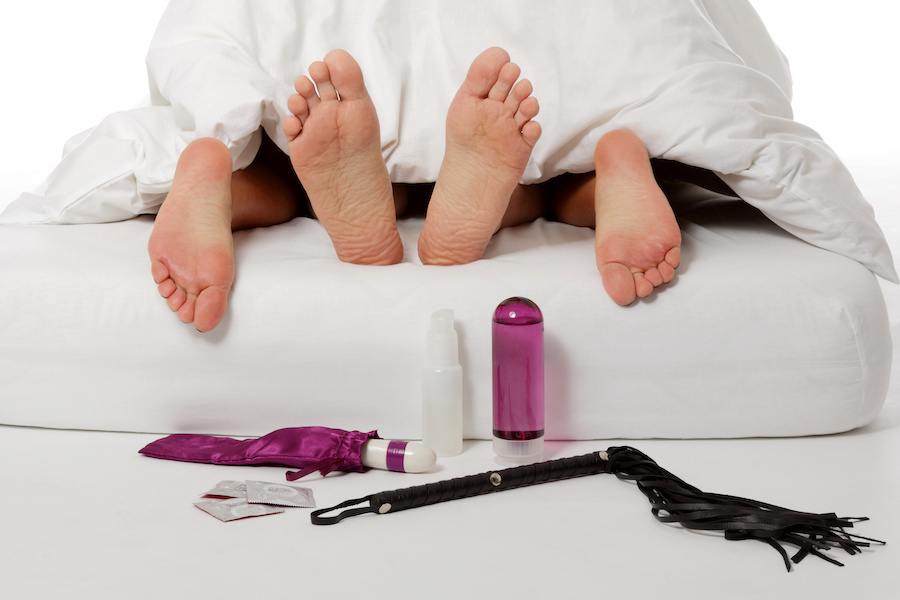
Ask the Experts: How Much Sex Is Normal?
Reality star Larsa Pippen talked about her sex life during the recent reunion episode of The Real Housewives of Miami, claiming that she and her ex-husband, former NBA star Scottie Pippen, had sex four times every single night for 23 years until their divorce in 2021.
Andy Cohen, stated, "You had sex 28 times per week, for 23 years?
That comes to a total of 33,488 sexual encounters over the course of the entire marriage."
Whether you believe it’s possible or not, Larsa Pippen's reveal has sparked debate about what constitutes a “normal” sex life.
We asked a panel of experts to help set the record straight.
Here are the questions we asked and our experts’ responses.
Q: Is the Amount of Sex the Pippens Had Unhealthy?
A: It’s difficult to label the Pippens’ sex life as “unhealthy,” when there’s so much missing context.
Dr. David Helfand, licensed psychologist and founder of LifeWise, emphasized that determining the Pippens' sex life is unhealthy depends on the underlying reasons for their frequency. “For some couples, sex is an expression of their love or a way to build intimacy. For others, sex is a way to fill an intimacy void. The latter is not healthy, while the former can be.”
Licensed professional counselor Esme Valette acknowledged that the Pippens were on the extreme end of the sexual frequency scale. But she also added, “You can't evaluate the health of a couple's sexual relationship by frequency.”
Certified sexologist Suzannah Weiss noted that there’s no specific amount of sex that’s unhealthy, unless it interferes with other aspects of life. She also pointed to the physical and mental benefits of sex for individuals and couples alike, stating, “It gives you a mood boost, relieves stress, and even helps with sleep and pain relief for some.”
Dr. Elizabeth Swenson, an OB/GYN at Wisp, stressed that there’s no defined unhealthy frequency, “as long as that sexual activity is consensual, safe, and enjoyable for everyone involved.” She advises seeking care from a medical professional if you’re concerned about your sexual health or frequency of sex.
Dr. Victoria Scott, urogynecologist and co-author of “A Woman's Guide to Her Pelvic Floor: What the F*@# is Going On Down There” also commented on the importance of staying on top of your physical health when it comes to frequent sex. “When it comes to frequency of sex, as long as they are having safe sex and neither partner is having pain or developing infections or other complications, there is no ‘unhealthy’ amount of sex they can have. Adequate lubrication and communication between the couple are essential to having frequent sex.”
Sarah Chotkowski, clinical social worker and founder of The Pomegranate Institute, highlighted the subjective nature of normalcy in sexual frequency, emphasizing that what works for one couple may not work for another. She had a predominantly positive take, adding, “I think Larsa’s comments make a great sound bite, and I hope she enjoyed every single one of her 33k sexual encounters!”
Licensed clinical psychologist Erika Bach, PsyD, who specializes in relationships and couples, responds: “There is no one-size-fits-all answer when it comes to this question. If someone is having sex this frequently, they need to check in with themselves surrounding the motivation to have sex, how they feel during, and how they feel afterwards. If having sex this frequently feels like a natural urge, enjoyable during and afterwards, I don't see the harm in it. If this frequency reflects a pathological drive, or addiction, or people-pleasing behavior, I would encourage self-exploration.”
Summary: Experts agree there's no one-size-fits-all for what's too much or too little sex. It really depends on why you're doing it and if both people are okay with it. Some say watch out for physical issues like soreness, while others stress the importance of talking and staying safe. There’s no set amount that’s “unhealthy,” as long as you and your partner are both good with it, it's safe, and it doesn't mess up your life. It's all about what feels right for you.

Q: What is the Typical Frequency of Sexual Intercourse Among Married Couples?
A: Some research suggests that married couples are happiest when they have sex about once per week. Our experts shared similar observations.
Clinical psychologist Louis Wood commented that research suggests that married couples have sex once a week on average. He also reminded readers that frequency isn’t everything, stating, “Sexual frequency is not a measure of the health of a relationship. I think that focusing on the quality of sex rather than the quantity is key.”
Weiss agreed, commenting, “The average amount of sex for a couple is actually just about once a week, so you shouldn’t sweat it if you’re not doing it as often as Larsa Pippen claims she did!”
Dr. Kirti Patel, a gynecologist, explained that the average varies by age and relationship length, with younger couples being most likely to have sex more frequently. Older couples may not have sex as frequently, but this also varies. “Some couples are having sex several times a day, while others rarely or never have sex.”
Dr. Swenson added that, in addition to age, health and personal preferences play a key role in sexual frequency. She pointed to research supporting this variation in frequency, noting, “What is considered ‘normal’ varies from one couple to another.”
Clinical sexologist Dr. Miro Gudelsky echoed this opinion, commenting, “Every couple truly has their own patterns with their own dynamics. Some couples may have sex every couple weeks, and others may have sexy three times a day. These numbers fluctuate for every couple throughout their relationship.” She added that two to three times per week works well for most busy, committed couples.
Summary: There’s no set frequency for how often married couples should have sex. The average frequency is about once a week, but this varies widely, so there’s no need to stress if you’re not doing it every day. The experts highlight that the frequency doesn't measure the health of the relationship. Frequency is influenced by factors like age, health, life stressors, and relationship length. At the end of the day, experts emphasize focusing on quality, not quantity.

Q: What are Some Strategies for Enhancing Sexual Relationships Among Couples?
A: Couples who are worried about their sexual frequency might want to explore ways to revamp their physical and emotional intimacy. Here’s what our experts recommended.
Dr. Helfand recommends couples rekindle intimacy by recalling behaviors from early in the relationship, like dancing, gazing into each others’ eyes, breakfast in bed, or other activities that spark erotic energy. “Couples often forget about the behaviors that brought them closer at the beginning of the relationship, and it’s important to use that formula to respark your intimacy later in life.”
Dr. Erika Bach, clinical psychologist, encouraged couples to get curious and ditch the judgment. “The first place to start is with honest, open dialogue without judgment where curiosity is allowed to be the foundation. This way, both partners can explore within themselves and with each other what might be exciting and pleasurable for them to experiment with and what they really like.”
Chotkowski recommended going back to the “basics,” by building intimacy before focusing on sex again, stating, “I recommend scheduling quality time with each other and focusing on creating intimacy rather than sex. It can be as simple as having a date night where you both agree to put your phones in the other room, or watching a new show neither of you have seen before. Cultivating an environment that fosters novelty and connection is a major turn-on.”
Wood agreed with Chotkowski and emphasized that enhancing sexual relationships involves prioritizing emotional connection, having fun, and dating, even in marriage. He recommends watching the TED Talk The Secret to Desire in a Long-term Relationship by Ester Perel for additional insight on the topic.
Valette shared quick tips for enhancing sexual relationships. These include using a vibrator for increased satisfaction, incorporating lube for enhanced sensations, and trying new things by completing a yes, no, maybe checklist. She encouraged couples to “run, don't walk to your local sex shop or convenient store.”
Dr. Swenson shared a list of her top strategies for enhancing sexual relationships. These included practicing open and effective communication, spending quality time together outside the bedroom, being open to experimentation in the bedroom, and prioritizing a healthy lifestyle.
She cautioned, “It’s also essential to address any medical or psychological issues that may be affecting your sexual health with the help of healthcare professionals or therapists.”
Summary: If you’re looking to add some excitement to your relationship, our experts suggest bringing back early dating behaviors, like dancing or morning eye gazes, to reignite the spark. Plan date nights, make time for physical and emotional connections throughout the day, and consider scheduling sex without pressure.
It might also be a good time to shake things up by trying new things, like using a vibrator or exploring fantasies together.
Q: What is the Best Strategy When Couples Don’t Agree with the Amount of Sex They’re Having?
A: It’s normal for couples to experience a mismatch in libido or sexual function. Here’s how our experts recommend addressing these issues.
Dr. Miro defined this for readers as “desire discrepancy.” She reminds couples that both partners can experience complex emotions as a result of their higher or lower sex drive. “There can be so much guilt on the side of the partner with the higher drive. Feelings of rejection can be pretty [over]whelming when the person you love continues to say no to your advances. Meanwhile, the lower drive person can develop resentment from the pressure of feeling like they are ‘always’ being hounded for sex.”
Valette also pointed to the complex and difficult emotions that can arise for both higher- and lower-sex drive partners. She recommended navigating desire discrepancies through respectful communication, understanding, and learning to say 'no' without guilt. Specifically, couples need “to learn how to hear and say no and stay in connection.”
Dr. Bach advised finding a compromise that works for both partners and asking, “What feels like a need, and what feels like it has more flexibility?” She added that couples might also explore intimacy through cuddling or other acts.
Dr. Patel agreed that compromise is key, but cautioned that it can be challenging. “Sometimes when couples are very sexually mismatched, it can be very difficult to ever come up with a compromise that both can be happy with, and it can really strain the relationship. In that case, I'd recommend they work together with a sex therapist to find creative solutions.”
Sometimes, it’s less about libido and more about physical health.
Dr. Jennifer Anger, urogynecologist and co-author of “A Woman's Guide to Her Pelvic Floor: What the F*@# is Going On Down There” commented, “When one partner has a medical condition that impacts drive or arousal, seeking treatment can be quite helpful. For example, vaginal dryness can prevent women from wanting to have sex, but treatment with vaginal estrogen can improve lubrication and reduce pain. Men with erectile dysfunction can be treated with medication, which may improve their sex life.”
Dr. Eric Chaghouri, medical director of Lucid Wellness Center, stressed the importance of healthy communication and finding middle ground without guilt or pressure. He added, “Talking it out helps you understand each other and reach a middle ground that doesn’t compromise desires or boundaries.”
Summary: When couples disagree about their sex life, understanding and compromise are key. Broadening the definition of sex beyond penetration and exploring shared interests and fantasies can be helpful approaches. Seeking guidance from a sex therapist or couples counselor is valuable for significant mismatches, and open, respectful communication is crucial for finding a satisfying compromise that respects both partners' needs and desires.
The Bottom Line: How Much Sex is Normal?
There is no universally defined "normal" for the frequency of sex in a relationship. Our panel of experts emphasizes the importance of consent, communication, and individual motivations. Averages vary widely, from once a week to a few times a week, and the key is to focus on creating intimacy rather than adhering to a specific frequency.
For couples facing mismatched desires, compromise, communication, and seeking professional guidance, such as sex therapy, are suggested strategies. Ultimately, what matters most is finding what works best for each individual couple.
Enjoy Your Best Sex Life, Thanks to eDrugstore
We have what you need to get your sex life back on track at eDrugstore. Explore our blog to find evidence-backed solutions for your intimacy and sexual health challenges.
Getting a prescription or ordering sexual health solutions is easy with eDrugstore.com. We offer free and discreet delivery on all orders. And if you need to talk to a licensed physician first, our team is here to help. If erectile dysfunction is interfering with the frequency or quality of your sex life, our complimentary telemedicine consultation can help you choose the best prescription for your lifestyle.
Meet Our Panel of Experts
Background information for each expert consulted for this article is provided below.
David Helfand, PsyD, Licensed Psychologist
Dr. David Helfand is a licensed psychologist specializing in Couples Therapy Retreats, neurofeedback, and brain mapping. As the founder of Marriage Quest, located in Vermont, Dr. Helfand is dedicated to enhancing relationships and mental well-being.
Suzannah Weiss, Certified Sex Educator and Sexologist
Suzannah Weiss is a sexologist for BedBible and an AASECT-certified sex educator.
Louis Wood, MA, LPC, Certified Sex Therapy Supervisor
Louis Wood is a Licensed Professional Counselor, Certified Sex Therapist, and Certified Sex Therapy Supervisor. He holds a Master's degree in Clinical Psychology and certifications from AASECT. He is also the founder of Orchid Toys.
Erika Bach, PsyD, Licensed Clinical Psychologist
Dr. Erika Bach is a Columbia-trained licensed clinical psychologist based in New York. She specializes in relationships and couples.
Kirti Patel, MD, Gynecologist
Dr. Kirti Patel specializes in Gynecology and Women's Health at UMass Memorial Healthcare – Harrington Hospital. She has an interest in sexual medicine.
Sarah Chotkowski, LPC, Clinical Social Worker
Sarah Chotkowski is a clinical social worker in private practice and the founder of The Pomegranate Institute. She specializes in working with patients in erotically marginalized communities (LGBTQ, ENM, kink, fetish, etc.).
Esme Valette, Licensed Professional Counselor
Esme Vallette of www.herpsychotherapy.com is a Licensed Professional Counselor focused on mind-body wellness. She specializes in mindful growth and trauma recovery.
Eric Chaghouri, MD, Psychiatrist and Medical Director
Dr. Eric Chaghouri is a psychiatrist and medical director of Lucid Wellness Center in Los Angeles, CA.Elizabeth Swenson, MD, OB/GYN
Dr. Elizabeth Swenson is an OB/GYN at Wisp.
Jennifer Anger, MD, Urogynecologist
Dr. Jennifer Anger of Down There Doctors is a urogynecologist and co-author of "A Woman's Guide to Her Pelvic Floor: What the F*@# is Going On Down There” With over 250 peer-reviewed articles and extensive international lecturing experience, Dr. Anger is a renowned expert in her field. Her practice specializes in gender affirming surgery, and she holds the position of Professor of Urology and Vice Chair of Research at the University of California, San Diego Department of Urology.
Victoria Scott, MD, Urogynecologist
Dr. Victoria Scott of Down There Doctors is a urogynecologist and co-author of "A Woman's Guide to Her Pelvic Floor: What the F*@# is Going On Down There. She is dedicated to improving the care of women with pelvic floor disorders. Her current efforts focus on educating primary care providers in the treatment of these conditions. Dr. Scott has served as the Director of Education for the Cedars-Sinai FPRMS fellowship training program and as faculty for the Cedars-Sinai Urology Residency training program.
Miro Gudelsky, PhD, Certified Clinical Sexologist
Dr. Miro Gudelsky is a practicing Sex Therapist, Presenter, Consultant and Coach. She holds a doctorate in human sexuality from The Institute for the Advanced Study of Human Sexuality and an associate’s in sex education. She is a certified clinical sexologist by the American College of Sexologists and is a certified erotology appraiser.



